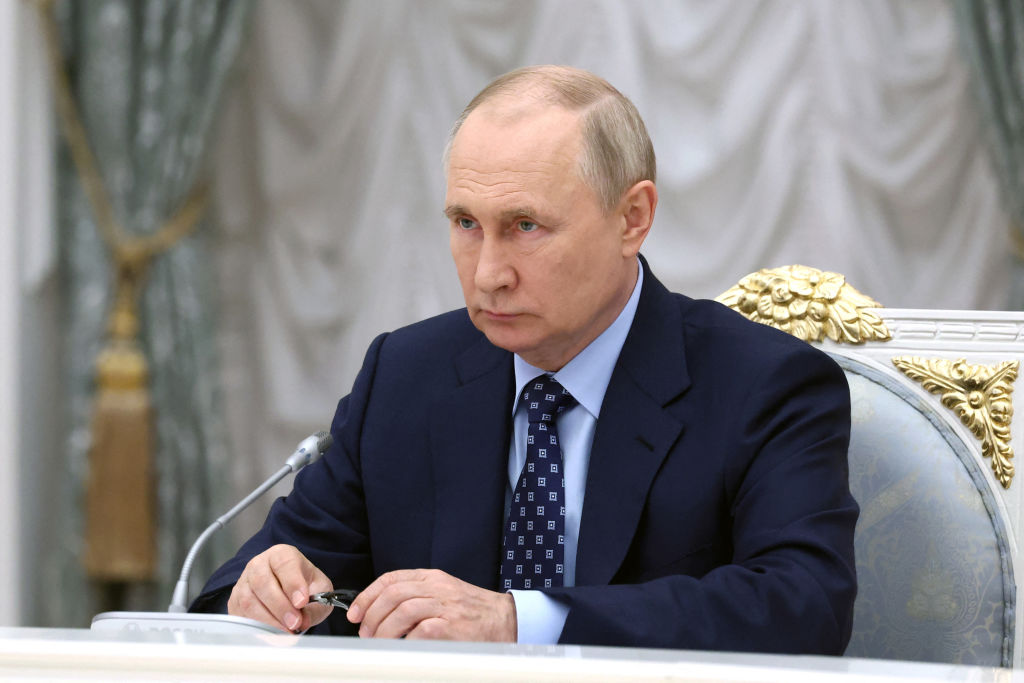When personal sanctions on Russian oligarchs and officials were imposed by the US, EU and UK after Putin’s invasion, the rationale was that this would undermine the Kremlin. In the main, this has failed — and there is still no coherent strategy to encourage those Russians willing to turn against the regime.
Wider economic sanctions are slowly grinding away at the economic base of Putin’s regime and its war machine. The case for personal sanctions is much less clear. It is absolutely right and proper that those directly involved in the war, conducting repressions or justifying aggression ought to be punished. However, in their enthusiasm to be seen as taking a determined stand (and, in part, driven by what one British diplomat described as “performative one-upmanship”), all sorts of other Russians, especially wealthy ones, ended up on these various lists. As things stand, the US has sanctioned more than 3,000 people and entities, the UK over 1,600 and the EU almost 1,800.
The irony is that sanctions, visa and travel bans and asset seizures have left these people more dependent on the Kremlin
One frequently-used argument at the time was that this would induce the oligarchs to try and persuade Putin to change course or even turn against him. This was always naive. Most so-called “oligarchs” are not really businesspeople but hand-picked cronies placed in charge of key economic sectors.
The remaining genuine entrepreneurs know what could be at stake, as demonstrated when billionaire Mikhail Khodorkovsky was prosecuted on trumped-up charges early in Putin’s reign: their wealth, their freedom, even their lives depend on toeing the line. They lack the autonomy, let alone the muscle, to challenge Putin’s police state.
Only two oligarchs initially expressed blandly ambiguous concerns about the war. Banker Mikhail Fridman, born in western Ukraine, wrote in a letter to staff that he wanted the “bloodshed to end.” Industrialist Oleg Deripaska likewise simply said that “peace is very important! Negotiations need to start as soon as possible!”
The irony is that sanctions, visa and travel bans and asset seizures have left many of these people more, not less dependent on the Kremlin. They cannot travel abroad and what remains of their wealth is disproportionately in Russia — and thus in Putin’s grasp. It is often also dependent on government contracts.
Of course, none of this should matter. Ideally, people should stand up for what is right, regardless of the economic or personal cost. How many of us really would, though? For every Martin Niemöller (the Lutheran pastor who criticized Nazi policies and spent eight years in prison and concentration camp for his pains), “Beijing Tank Man” (the unknown protester who lay down in front of Chinese tanks amid the 1989 Tiananmen Square Massacre) or Alexei Navalny (who returned to Russia even after being poisoned, and now languishes in prison), there are myriad who share the sentiment but not the courage to act.
We may deplore this, but here we are. We ought to be doing what we still can to encourage prominent Russians to break with Putin. Yet this is one area in which the West is still struggling to get its act together. None of the sanctioning powers have any clear criteria — publicly denounce the war, donate assets to Ukraine, whatever — for coming off these lists, which would offer a road map out of limbo.
The UK led the way by last month lifting sanctions on the innovative Russian banker Oleg Tinkoff. He had renounced his Russian citizenship, sold his share of the bank he had founded, and publicly declared his opposition to Putin’s “insane” invasion and the “killing of peaceful people.”
Now Arkady Volozh, co-founder of the tech giant Yandex, resident in Israel since 2014, is appealing for EU sanctions on him to be lifted. His attempts to manage a sale of his stake in Yandex, even at a substantial discount, appears to have been foiled, along with his plan to hive off its foreign operations. His chances of getting anything for a company worth more than $25 billion at its peak seem close to zero now that he has publicly condemned the invasion as “barbaric.”
Volozh, like Tinkoff, no doubt has expensive teams of lawyers working his case, and doesn’t necessarily need our sympathy. One can also legitimately ask both men why it took so long for them to express their views. Yet the real question given that only two Russian billionaires — both of whom were already living abroad — have come out against the war, is what can be done to encourage more to make this leap?
It would be easy to say that it doesn’t really matter, but both were nearly household names. Volozh, for example, has disappeared from the Russian news since he took his stand — and people have noticed. Besides, figures like Tinkoff and Volozh were innovators driving the very real development of the Russian economy in the earlier Putin years, not the self-indulgent kleptocrats holding it back. The more Russia can be drained of its truly talented operators, from computer programmers (and hackers) to entrepreneurs and managers, the less effectively it will able to respond to the twin pressures of war and sanctions.
As far as we know, Putin has not yet unleashed his assassins on businesspeople who have fled, but his hatred for “traitors” is well known. If Tinkoff and Volozh start a trend, that may change. This is, however, a good moment to seriously consider a strategy that leverages the existing pressure of sanctions on the less compromised and more competent members of the Russian business and professional classes and gives them reason to jump ship. Simply offering the uncertain chance of a case-by-case review to those with the resources to hire the right lawyers is not enough.
Indeed, this need not be simply about lifting sanctions on some rich people. If we really want to starve the Russian regime of talent, why not make it easier, not harder, for Russians opposed to the war and possessing the skills we need, to find new lives in the West? Conversely, the tougher we can be on the political hacks, secret policeman and cronies of Putin, the better.
This article was originally published on The Spectator’s UK website.

























